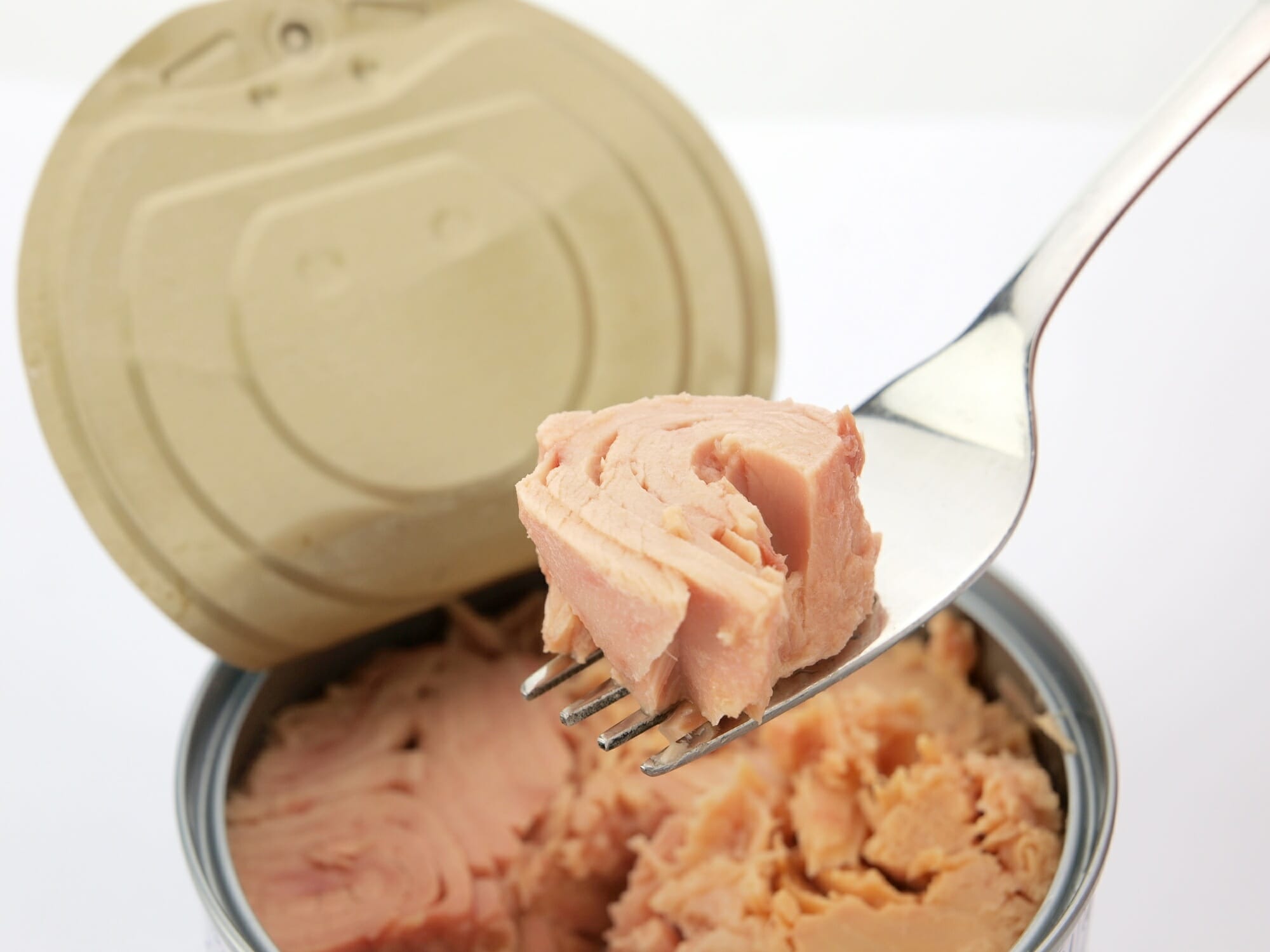Were you just about to feed your dog some canned salmon but you remembered to look it up first? Good, because it is important to learn more about the benefits and potential dangers of adding salmon to your dog’s diet.
If you’re wandering can dogs eat canned salmon, the answer is yes? But, before you go ahead and give your puppy a plate of delicious fish, make sure to read this whole guide in order to make sure you’re not overfeeding him with the wrong kind of salmon.
I personally had this same question a while ago and, if I hadn’t looked it up in time, I would’ve ended up giving my dog something he should absolutely never eat. To make sure you avoid this mistake too, read on to find out more about dogs and canned salmon!
Let’s Get Straight to the Point
Yes, it is safe for dogs to eat canned salmon. In fact, this kind of food will improve their diet, considering it is rich in omega 3 fatty acids and important protein. This can even be a good alternative food if your dog is allergic to chicken.
While salmon might be high in sodium, which can be an issue for dogs suffering from bad health conditions, it is perfectly okay for a healthy dog to consume salmon once or two times a week.
Therefore, as long as you’re giving your dog reasonable amounts of salmon, there should be no issues whatsoever. In fact, most high-quality dog foods contain salmon as the major ingredient.
So, you will be doing your dog a favor. However, keep in mind that there are things you need to be careful about when giving salmon to your dog, as sometimes it can cause serious consequences.
What Not to Do
What you should never ever do is give your dog raw and uncooked salmon. Even poorly cooked salmon can cause a lot of health issues.
The reason you must be careful is that uncooked salmon can contain a common parasite that leads to food poisoning. This parasite is so dangerous that it can potentially lead to death.
Besides, raw salmon contains small bones that can be hazardous as well. These can lead to choking or even damage the dog’s intestines and cause serious consequences.
There is no doubt that feeding your dog raw salmon can lead to serious health issues so make sure to always check whether the food is cooked thoroughly. Also, check for bones and remove them if there are any.
What to Do
What you can do, on the other hand, is serve finely cooked, boneless salmon to your puppy. Make sure to use fresh boneless fillets and cook them thoroughly without using any oil or seasoning.
If you don’t have time to cook the salmon yourself, you can use canned salmon as an alternative option. However, make sure to only buy the canned salmon in water to avoid feeding your dog oils or other harmful ingredients.
Health Benefits of Salmon
I already mentioned that salmon is a great source of omega 3 fatty acids and important proteins. It also brings along plenty of other health-related benefits, such as boosting the immune system and helping brain function.
Consuming salmon once a week will lead to your dog having healthier skin and a shiny coat. Salmon is also known to reduce irritations and inflammations caused by skin allergies and it also helps maintain healthy joints.
On top of all the great benefits this food provides, it is also rich in essential vitamins and minerals, including vitamins A, D, and B complex.
Possible Negative Consequences and Symptoms
Unfortunately, salmon can often lead to health issues if not cooked properly. The biggest negative consequence is food poisoning caused by unhealthy parasites. This can lead to symptoms such as vomiting, diarrhea, eye and nose discharge, and fever.
In the worst cases, these symptoms can be fatal for the animal. However, since many symptoms can be considered generic, you can never be sure if they were really caused by food poisoning or salmon bacteria.
If your dog starts having these symptoms after consuming salmon, make sure to take him to the vet immediately in order to get proper diagnostics.
Can you feed your dog raw salmon?
No, salmon should be cooked first before feeding your dog. Raw fish has some risks:
1. infectious salmon anemia virus (ISA).
This is a parasitic viral disease that causes bleeding anemia in dogs. It is transmitted from the parasite found on raw salmon.
Symptoms are lethargy, pale gums, and nose bleeds because of blood cell breakdown by the ISAV virus. The incubation period lasts about 15 days, and then the symptoms appear suddenly. Your dog will likely die within two weeks given this infection if it is untreated.
2. other dangerous pathogenic organisms like “Aeromonas” can also infect your dog when you feed him or her raw frozen smoked salmon. The symptoms will not appear until several weeks (can be for up to three months) after your dog has ingested it, and this disease can cause death in a short period of time. It also has the ability to infect people as well.
3. Salmon toxicosis is another condition that can affect your dogs’ health if he eats too much raw salmon. This results from eating too much protein or fat from the salmon without enough water to process it properly, and so different organs start shutting down like the kidneys and liver, leading to death. Other symptoms include vomiting, diarrhea, panting excessively, and going off their food.
What kind of canned salmon is safe for dogs?
1. Be sure it is low in sodium
The next thing to look out for is the salt content. Canned salmon should not have added salt, as dogs already get a lot of sodium from other meats.
High sodium levels in canned salmon can cause your dog to suffer from congestive heart failure, so it’s important that you choose one that does not contain any of this added preservative.
2. Boneless canned salmon
Buy boneless canned salmon; it is safer for your dog as the bones in canned salmon tend to get stuck in his throat and digestive tract. This blockage may cause perforation of the intestines and other related digestive organs.
3. A brand you trust
Go for a reliable brand that has been around for several years. A brand that is not recognized may contain toxicants or other chemicals which may be harmful to your dog.
4. Smell and texture
You need to ensure that the canned salmon does not have any foul smell, has a firm texture (not soft or mushy), and the salmon is pink with no dark spots. The best canned salmon you can feed to your dog is one that does not have any added salt, sugar, or other preservatives.
Is canned salmon cooked or raw?
Canned salmon is already cooked and you can feed it to your dog. It is a good alternative for your dog when you want to switch from dry food to wet food. However, make sure that the canned salmon does not contain any added salt or sugar.
Best Dog Food with Salmon
If you want to add salmon to your dog’s diet but you don’t feel like cooking it or even feeding him the canned alternative, you can always go for dog food products. In fact, this is the safest option when it comes to feeding your dog salmon.
To help you choose one product out of hundreds of varieties, I did the research for you and found the best dog food with salmon. The Blue Buffalo Wilderness is enhanced with vitamins and minerals, NO artificial flavors or preservatives, and is free from bones and unhealthy bacteria.
It only contains premium quality ingredients, including various nutrients such as protein and vitamins. At the end of the day, it is always best to give your dog premium quality food made by manufacturers you can trust.
However, even if you decide to go for the dog food option, limit your dog’s salmon intake to once a week, as that is more than enough to give them the necessary nutrients.
Conclusion
To wrap it all up, I hope you’ve learned something new when it comes to dogs and their diets. It is important to stay educated on these topics because feeding your dog the wrong food can lead to serious issues.
Don’t forget to leave a comment and let me know which salmon food variety are you going to include in your dog’s diet. Also, feel free to leave any questions you may have!
What to take away from this article
- Yes, dogs can eat canned salmon
- Limit the salmon intake to once a week
- Never feed your dog raw or uncooked salmon
- Choose canned salmon with water, make sure it contains no oils
- If you’re going to cook the salmon yourself, don’t add oils or seasoning
- Consider dog foods with salmon as a good alternative
- If your dog starts having any symptoms after eating salmon, take him to the vet immediately

